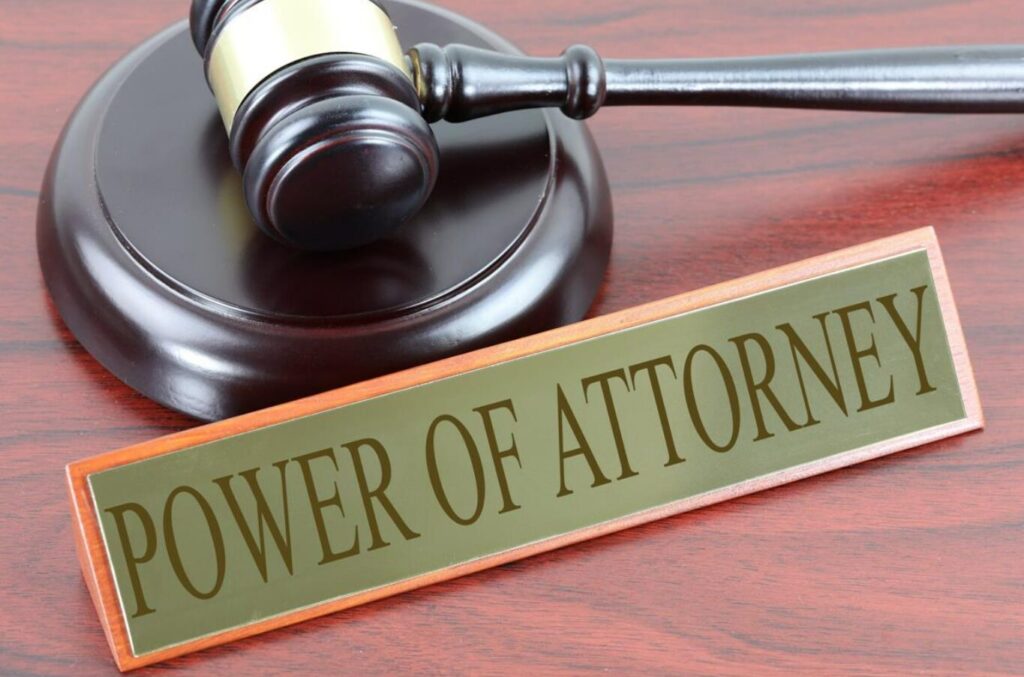Power of Attorney
A Power of Attorney (POA) is a legal document that grants someone else the authority to act on your behalf in legal, financial, healthcare, or other matters. The person granting the authority is known as the “principal,” and the person receiving the authority is referred to as the “agent” or “attorney-in-fact.

What Is a Power of Attorney
Types of Power of Attorney: There are various types of power of attorney documents, each granting different levels of authority to the agent. Common types include :General Power of Attorney: Grants broad authority to the agent to manage the principal’s affairs, typically for a specified period. Limited or Special Power of Attorney: Grants specific powers to the agent for a particular purpose or within a defined scope. Durable Power of Attorney: Remains effective even if the principal becomes incapacitated or unable to make decisions. Springing Power of Attorney: Becomes effective only upon the occurrence of a specified event, such as the principal’s incapacity.
Authority Granted: The principal can specify the extent and scope of the agent’s authority in the power of attorney document. This may include managing finances, signing legal documents, making medical decisions, or handling real estate transactions.
Responsibilities of the Agent: The agent has a fiduciary duty to act in the best interests of the principal and must exercise the powers granted to them responsibly and ethically. Agents must keep accurate records of their actions and decisions made on behalf of the principal.
Revocability: The principal retains the right to revoke or modify the power of attorney at any time, as long as they are mentally competent to do so. Revocation typically requires formal notification to the agent and any relevant third parties who may have relied on the authority granted in the document.
Legal Requirements: To be valid, a power of attorney must meet certain legal requirements, which may vary depending on the jurisdiction. These requirements typically include signing the document in the presence of witnesses and, in some cases, notarization.
Purpose and Use: A power of attorney is commonly used in various situations, such as during periods of illness, incapacity, absence, or when the principal requires assistance managing their affairs. It is a valuable tool for estate planning, business transactions, healthcare decision-making, and other legal matters.
Benefits of Power of Attorney
Management of Affairs During Incapacity: A Power of Attorney allows individuals to appoint someone they trust to manage their affairs in the event of incapacity due to illness, injury, or advanced age. This ensures that important decisions can be made and financial matters can be handled even if the individual is unable to do so themselves.
Continuity of Financial Management: With a Power of Attorney in place, the appointed agent can continue managing the principal’s financial affairs without interruption, ensuring that bills are paid, investments are managed, and other financial obligations are met.
Flexibility and Customization: A Power of Attorney can be customized to meet the specific needs and preferences of the principal. The document can grant broad or limited authority to the agent, depending on the principal’s wishes and circumstances.
Avoidance of Guardianship Proceedings: By appointing an agent through a Power of Attorney, individuals can avoid the need for court-appointed guardianship or conservatorship proceedings, which can be costly, time-consuming, and intrusive.
Privacy and Control: A Power of Attorney allows individuals to maintain privacy and control over their affairs by selecting a trusted agent to act on their behalf, rather than relying on court-appointed representatives or third parties.
Efficiency and Convenience: Having a Power of Attorney in place can streamline decision-making and financial transactions, especially in situations where the principal is unavailable or prefers to delegate certain responsibilities to someone else.
Estate Planning and Asset Protection: A Power of Attorney is a valuable tool for estate planning, allowing individuals to designate someone to handle their affairs and make decisions regarding asset management, healthcare, and distribution of assets in accordance with their wishes.
Peace of Mind: Knowing that they have appointed a trusted agent to act on their behalf provides individuals with peace of mind, knowing that their interests will be protected and their affairs will be managed according to their instructions.
Documents Required Power of Attorney Form
.Identification Documents: The principal and the agent may need to provide identification documents, such as a driver’s license, passport, or other government-issued identification, to verify their identities. Witnesses: Some jurisdictions require witnesses to observe the signing of the Power of Attorney document. The number of witnesses and their qualifications may vary depending on local laws.
Notarization: In many jurisdictions, Power of Attorney documents must be notarized by a notary public to authenticate the signatures of the principal and witnesses. Notarization provides additional assurance of the document’s validity.
Specialized Forms for Specific Powers: Depending on the nature of the powers being delegated, specialized forms may be required for certain types of Power of Attorney, such as a healthcare Power of Attorney or a financial Power of Attorney.
Legal Advice and Consultation: While not a document per se, seeking legal advice and consultation is highly recommended when creating a Power of Attorney. Legal professionals can provide guidance on the specific requirements and implications of the document, ensuring that it accurately reflects the principal’s intentions and complies with applicable laws.
Specific Authority Documentation: In cases where the Power of Attorney grants specific authority for certain actions or transactions, additional documentation may be required to support those powers. For example, if the agent is authorized to sell real estate on behalf of the principal, documentation related to the property may be necessary.
Instructions or Terms of the POA: Clear instructions or terms outlining the powers, limitations, and conditions of the Power of Attorney are essential. These instructions help ensure that the agent understands their responsibilities and acts in accordance with the principal’s wishes.
Revocation Documentation (Optional): If the principal wishes to revoke or modify an existing Power of Attorney, documentation of the revocation or modification may be necessary to formally terminate the previous arrangement.



